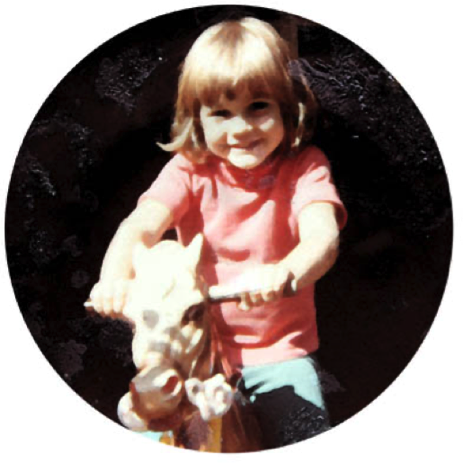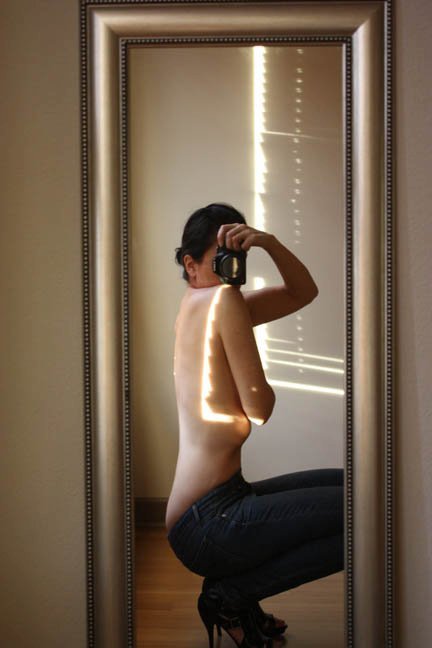Fuck You, Pay Me #1: How to Become a Writer in 12 Easy Steps
The writer at 4
This is part 1 of “Fuck You, Pay Me,” an ongoing series of posts on writing, editing, and publishing.
1. Get lucky. Be born. Have English professor parents. Be read to a lot. Learn to read. Read a lot. Go to a weird kindergarten that lets you sit in a box all day, reading books. Be taken to the library. Be taken to bookstores. Watch your father write books. Spend a lot of time on your own in your room, reading books. Cultivate an expansive imagination. Make up stories in your head. Listen to your father crouched down on the floor next to your bed making up bedtime stories that you’ll wish you could remember as an adult but can’t. Decide books are your friends.
2. Look for the helpers. Go to grade school. Go to high school. Bond with various English teachers along the way who tell you or suggest to you or make you feel like you are a good writer and think to yourself: Maybe I am. Drop out of high school in your senior year to the disappointment of pretty much everyone. Attend community college. Transfer to U.C. Berkeley as a junior. Major in English at the same university where your father is a professor. Fall in love with James Joyce. Fall in love with William Faulkner. Fall in love with Jacques Lacan. Consider becoming a writer.
The writer in Austin, Texas
3. Write a lot. Get accepted to a graduate school master’s degree program that is 50% literature and 50% creative writing. Move to Chicago. Make friends with other writers. Read more. Write more. Pen academic essays and short stories in which strange things happen. Graduate. Return to the Bay Area. Have your father die. Realize that you want to be a writer, now that your father (the writer) is dead. Start an online magazine about post-feminism with your friends from graduate school. Interview a porn star. Get invited to a porn set in Los Angeles. Move to L.A.
4. Find a niche. Become a sex writer. Write about the porn business. Appear on TV. Write for glossy magazines. Get hired to be a reporter on a Playboy TV show that’s basically “60 Minutes” on Viagra, a gig that takes you around the world and results in you visiting the Playboy Mansion three times. Date a famous comedian who dumps you. Date an artist who makes fire-breathing robots. Start one of the first sex blogs, which is called The Reverse Cowgirl; the tagline is: “In which a writer attempts to justify the enormity of her porn collection.”
5. Sell out. Leave L.A. for reasons you’ll be unable to understand later. Move to New Orleans, Louisiana. Publish a collection of short stories with a small publisher. Identify Hurricane Katrina is on its way to where you live and leave. Move to Norfolk, Virginia. Sell freelance articles, generate blog posts, and try to write a novel about the porn business but fail repeatedly. Move to Austin, Texas. Become a copywriter. Get hired to be the voice of Pepto-Bismol on social media, something at which you are good. Wonder what you’re doing with your life. Feel unsure.
The writer in Naples, Florida
6. Give up. Move to Chicago, Illinois. Get married. Get breast cancer. Feel like maybe you’re going to die, or maybe you’re not going to die, but either way the chemo makes you feel like you’re dying so what’s the difference. Survive. Write for the Forbes website. Try intermittently to stop writing about sex because you’re married and it seems unseemly. Keep writing about sex anyway. Move to Naples, Florida. Become extremely unsure who you are or what your life has become or what you’re going to do next. Get divorced. Move back to L.A.
7. Try again. Pick up the pieces of your life, attempt to arrange them into something else, and identify it looks like a mess. Start a strategic communications consulting business that you describe as “I tell C-suite guys what to do.” Decide that you’re going to write the memoir that you were trying to write when you were married, which is about how you were a human lab rat in a 30-year longitudinal study of personality starting when you were a kid. Apply for an investigative reporting fellowship at U.C. Berkeley, which is where the study was conducted, so you can research the book. Tell everyone you’ll never get the fellowship. Get the fellowship.
The writer in an experiment room
8. Face your fears. Move back to your hometown. Rent an in-law apartment in a house that’s less than a mile from the house in which you were raised. Start your investigating. Visit the preschool where you were studied. Explore the building in which you were studied. Take a selfie in one of the one-way mirrors through which you were spied on in an experiment room. Begin to wonder how this experience of being studied shaped the person you became. Wonder if people are who they are or if life changes people and if the latter is true, can writing the story or your life change you, too?
9. Write a book. Return to L.A. after the fellowship ends. Craft a book proposal about your human lab rat life. Acquire a literary agent. Sell the book on proposal to one of the big publishing houses on the other side of the country. Watch as the pandemic descends on the globe. Debate the point of writing anything, seeing as the world is coming to an end. Spend a long time writing the book. Have your mother die. Write your mother dying into your manuscript. Hire a freelance editor who helps you finish the book and whom you refer to as your “book doula.” Wait for the book to be published.
10. Believe in yourself. Get the book published. Appear on some book lists. Get some good book reviews. Have an article about you and your book published in a newspaper in which your photograph appears. Promote your book on social media. Do some interviews about your book. See your book in some bookstores. Thank people for buying your book. Hold your book in your hands and experience a mix of pride at your hard-won accomplishment and the clarity that it is far too late for either of your now dead parents to acknowledge it. Put the book on the shelf in your living room. Consider what to do next.
The writer in The New York Post
11. Question everything. Turn into the living embodiment of that meme in which a dog is sitting in a room that is afire and the words say: “This is fine.” If this is a midlife crisis or an existential crisis or some other sort of crisis, it is the quietest crisis ever, a kind of imploding. Who are you and what are you doing and is this who you are supposed to be? These are the same questions you have been asking yourself for a long time, and you still don’t have the answers. Interviewers want you to give them a happy ending to the story of your life when they ask you about your book, but this is your reality. Life goes on.
12. Start all over. Think about how over two decades earlier, you stood on the set of a porn movie and thought: I should write a novel about this. Think about all the times you have tried to write it and failed. Try to write it again. Fail again. Try writing it another way. Fail again for a second time. Think of another way to write it that is new, an idea that sounds like a terrible idea because maybe no one will read it because it’s so totally out there. Think about how the way you shouldn’t do things is exactly how you should do things. Try writing the novel that way. Love it. Keep writing it. Feel better. Keep going. You’re a writer now, after all.
Buy My Book I About | Blog I Newsletter I X I Instagram I LinkedIn I Consulting I Email




